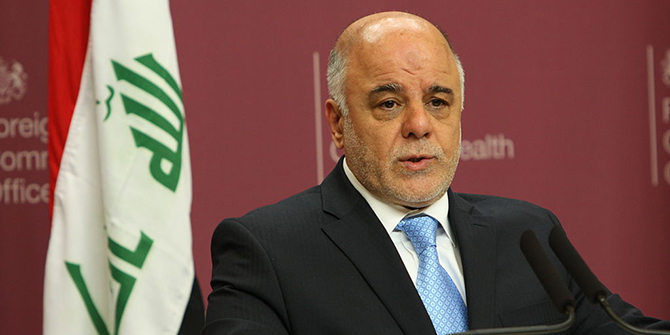by Farhan Siddiqi

Are the divisions between Shi’as, Sunnis and Kurds in Iraq so severe and entrenched that they are irreconcilable? Has Iraq reached its proverbial end? Though re-inventing itself as a federal, power-sharing democracy in the wake of the American invasion, Iraq’s political development since then has remained path-dependent, unable to shake off Saddam’s authoritarian legacy. While it is tough to predict how developments in Iraq will manifest in the future, Iraq’s new political dispensation under Haidar Al-Abadi is actively striving to move beyond Maliki’s destabilising ethno-sectarian legacy and treading the path of dialogue and reconciliation.
Post-Maliki Iraq: The Kurds
After assuming power, Abadi struck a major oil and budget deal with the Kurdistan Region. Signifying Baghdad’s new conciliatory approach, the Prime Minister was quick to point out that though imperfect, the deal was needed, and defending it stated that “even if I win a little bit more than him or the other way around, at least we’re not both losing.” A closer look at the agreement reveals that it is the KRG that has benefited most, as the deal implicitly grants the KRG the prerogative to export its own oil independently of Baghdad.
Will more available resources from independent oil sales as well as the federal budget, secure and stabilise the KRG-Baghdad relationship? It is not surprising that given Iraq’s volatility, an equal number of commentaries express doubts over the sustainability of the deal while others hail it as a success. No wonder then that only a few weeks after the deal was struck, President Barzani reiterated his desire for Kurdistan’s independence from Iraq, signifying the intention of the Kurdistan Region to go its own way.
Post-Maliki Iraq: The Sunnis
Maliki’s majoritarianism alienated the Sunnis to the extent that as a counterpoise, the Sunnis put their weight behind an extremist, militant ISIS. Haidar Al-Abadi attended to the Sunni grievance by appointing Khalid Al-Obeidi, a Sunni as Iraq’s Defence Minister, a post which had been reserved by Maliki himself. Furthermore, in a symbolic bipartisan gesture, Abadi visited Kadhimiya, a Shi’a area, and Adhamiya, a Sunni area on the occasion of the birth of the Holy Prophet Mohammed.
The issue of attending to Sunni re-engagement in Iraq is a thorny and complicated one. It continues to be inflammatory because of the capitulation of the Iraqi Army and Baghdad’s reliance on the Shi’a-dominated Hashd al-Shaabi or Popular Mobilisation Unit. The Mobilisation Unit, now allegedly led by Abu Mahdi Al-Muhandis, and bolstered further by increased allocation for military and security institutions in the 2015 budget, has reportedly supported Sunni tribes in Ramadi, Dhuluiya and Heet, but their presence in the Sunni areas is inflaming sectarianism with the Sunni tribes protesting their massacre at the hands of the Shi’a-led security forces. The Sunni grievance against the Shi’a popular fighting force is combined with the claim that the “Iraqi government is a tool in the hands of Iran”, as echoed by the Anbar tribal chief.
Tackling Domestic Opposition
Interestingly, Abadi has countered domestic opposition for his war against corruption and stated intention to proceed with fraudulent recruitment into the Iraqi Army from none other than Maliki who stated that the ‘army is free of ghost soldiers except for a few rare cases which are being followed up.’ Maliki also denounced the Baghdad-Erbil Agreement by reiterating that the ‘oil of Kurdistan is like the oil of Basra, and it belongs to Iraq.’ Tensions between Abadi and Maliki were apparent in that Abadi complained about Maliki to American officials specifically accusing the former Iraqi Premier for his role in handing down a death sentence to a Sunni politician, Ahmed Al Alwani.
Conclusion
Abadi has won respect from many quarters including President Barzani who praised Abadi for taking good steps, while “previously, there was discrimination.” The politics of Abadi, in contrast to the authoritarianism of Maliki, amplifies the fact that the Shi’a, Sunni and Kurd identity is not inherently antagonistic to each other and is reconcilable provided measures are put to that effect by the government in Baghdad.
Furthermore, recent signals from Baghdad suggest that alternative political solutions are being considered. In a Dawa Party meeting in December 2014, the idea of a Shi’a Region in central and southern Iraq was contemplated. Is this then the probable future for Iraq, that is, a loose federal arrangement where the cohesion of the Iraqi state perseveres albeit with significant socio-political and economic autonomy for the Shi’as, Sunnis and Kurds? Consequently, if all three major components of Iraqi society do decide to part ways or work out a formula for co-existence in an asymmetrical federation, it is best that they do it peacefully rather than through further bloodshed and violence.
A longer version of this post originally appeared on the MERI website on the 1st of February 2015.
 Dr. Farhan Hanif Siddiqi is Research Fellow at the Middle East Research Institute (MERI). His research interests include ethnicity, nationalism, ethnic conflict and security and conflict dynamics in the Middle East and South Asia.
Dr. Farhan Hanif Siddiqi is Research Fellow at the Middle East Research Institute (MERI). His research interests include ethnicity, nationalism, ethnic conflict and security and conflict dynamics in the Middle East and South Asia.





